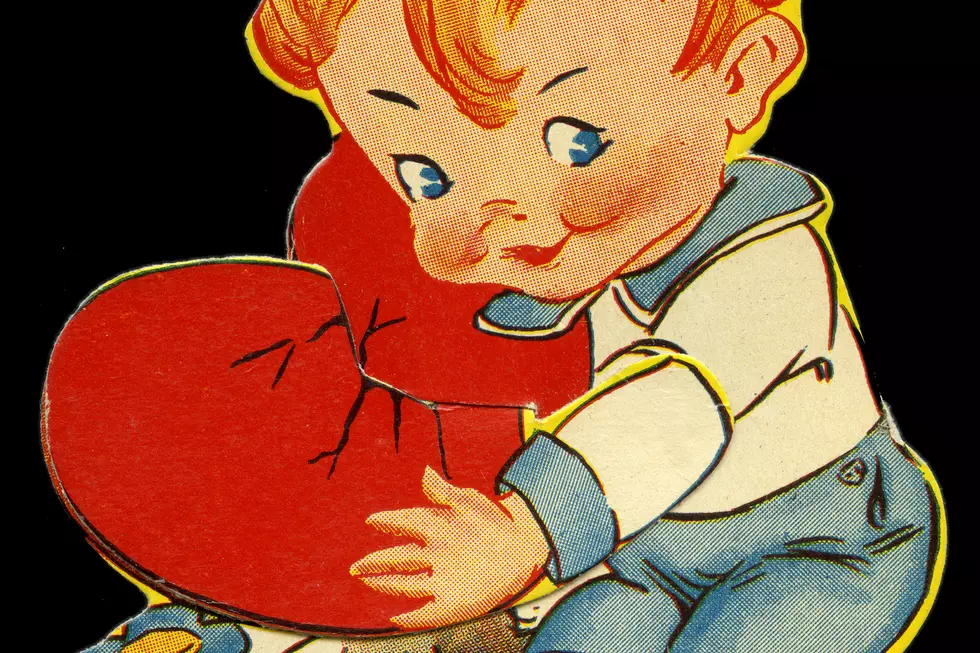
Rock Ain’t Dead: Debating the Argument Guitar Music Has Run Its Course
“NOSTALGIA ISN’T WHAT IT USED TO BE.” -- anonymous graffito
It’s the end of the year, so critics are trotting out their “best of” lists to highlight 2013’s outstanding music. (Looks like it was a Queens of the Stone Age, Vampire Weekend kind of year.) No one is above making pretentious selections and commercial compromises, and then there's the constant problem of subjectivity, but despite their flaws, these year-end roundups are in their own way noble. At their humble best, they celebrate great recent work and give exposure to worthy bands.
Of course, the act of throwing any enthusiasm behind the latest rock releases feels weirdly like an act of defiance, a shout into the wind considering the doom talk that hangs over themovement like a black cloud. Earlier this year, the Huffington Post ran an editorial called 'Rock and Roll Is Dead,' a classic “they don’t make ’em like they used to” think piece. The author, University of Chicago professor Jerry A. Coyne, Ph.D, corrals all the usual arguments to declare the once-vital music form extinct. Rock 'n' roll, Coyne tells us, “had its run and now it’s over. It is an ex-music form and sings with the choir invisible.”
You’ve heard this claim before.
If you’re a child of the baby-boom generation, you’ve probably heard it your whole life, or at least as far back as the late-’90s pop boom, when boy bands were sprouting like weeds and Britney Spears clutched a Teletubby on the cover of Rolling Stone. Year after year, we’re given the bad news: Audiences don’t care about guitars or integrity anymore. Today’s music could never stack up against the ’70s. Rock 'n' roll, that great American pastime, is dead.
No, it’s not, and if you’re feeling pithy, you can disprove this inane theory in four words: 'Celebration Rock' by Japandroids. That roaring 2012 album alone proves that traditional rock 'n' roll -- restlessly youthful music built on go-for-broke intensity and really, really loud guitars -- is alive and well, thank you.
But there’s plenty more to unpack here -- more holes to poke in this sorry old argument.
Coyne kicks off his article by voicing his disgust for the recent Avril Lavigne song 'Rock N Roll,' which he uses to condemn the whole state of the art. As per Coyne, Avril’s shortcomings include a lack of musicality -- it's just "shouting, he writes -- and a penchant for “shock value." The biggest problem of all: “AUTOTUNING.” Haven’t shouting vocals and shock value been part of rock 'n' roll for a while now? And hasn’t Auto-Tune been used in clever and innovative ways by heavy-hitters like Kanye West? These aren’t signs of rock’s end; they’re neutral elements to be used well or poorly -- just more tools in the artist’s belt.
Like any art form worth keeping around, rock evolves in jarring, unexpected ways, absorbing new sounds and building on them. Today it’s hard to imagine the genre without its ornery offshoot punk, yet when punk broke, it was actually a hostile reaction to the rock of the day. (The Sex Pistols’ Johnny Rotten wore a homemade “I Hate Pink Floyd” shirt.) This decade, plenty of artists have demonstrated rock’s staying power by mixing it with other styles. Listen to the booming guitar menace of Kanye’s 'Power,' the hypnotic outro of Frank Ocean’s 'Pyramids' or the Wall-of-Banjos assault in Mumford & Sons’ 'I Will Wait,' and it’s clear the genre is being pulled into exciting new shapes, gaining renewal from redefinition.
Yet journalists, perhaps made paranoid by the declining revenues of their own industry, wring their hands and declare it's all going downhill. Coyne goes so far as to claim that music in general -- not just rock -- is diminishing because “eventually every art form, with the possible exception of movies and the novel, degenerates.”
What? Obviously, the recession and growth of piracy have driven down net music sales, but that in no way means collective interest is waning. There’s still a capacity for world-taking popularity because there’s still a capacity for amazing work. At the end of 2008, New York magazine called Lil Wayne’s blockbuster 'Tha Carter III' “a throwback to the time when pop stars commanded huge CD sales” and claimed that with its release, he “quite possibly closed out an era.” Apparently, he did not, since two years later, Adele sold 25 million copies (and counting) worldwide of 21.
And anyway, since when did sales figures reveal the actual state of rock 'n' roll? In his article, Coyne uses the top 10 entries in a recent Billboard Hot 100 chart to prove rock’s scarcity:
1. 'Blurred Lines' by Robin Thicke
2. 'We Can’t Stop' by Miley Cyrus
3. 'Radioactive' by Imagine Dragons
4. 'Get Lucky' by Daft Punk
5. 'Holy Grail' by Jay Z (with Justin Timberlake)
6. 'Cups' by Anna Kendrick
7. 'Treasure' by Bruno Mars
8. 'Clarity' by Zedd
9. 'Safe and Sound' by Capital Cities
10. 'Love Somebody' by Maroon 5
OK, but here’s a randomly selected sample of the top 10 in 1971:
1. 'Family Affair' by Sly and the Family Stone
2. 'Theme From Shaft' by Isaac Hayes
3. 'Have You Seen Her' by Chi-Lites
4. 'Got to Be There' by Michael Jackson
5. 'An Old-Fashioned Love Song' by Three Dog Night
6. 'Baby I’m-A Want You' by Bread
7. 'Gypsys, Tramps & Thieves' by Cher
8. 'All I Ever Need Is You' by Sonny and Cher
9. 'Brand New Key' by Melanie
10. 'Desiderata' by Les Crane
With all due respect to Cher, that list isn’t very rocking or rolling either. Haven’t the charts always been a haphazard collection of disposable pop, fleeting trends and the occasional actually good song? If they didn’t reflect rock’s dominance in 1971, when did they?
Coyne offers up a list of old artists he believes will never be surpassed: “the Beatles, the Stones…the Band, Joni Mitchell, Eric Clapton, Ray Charles, Buddy Holly, Bob Dylan, Jimi Hendrix, Neil Young.” It’s easy enough to counter this with just as many compelling modern acts, so here goes: Arcade Fire, Titus Andronicus, Adele, My Morning Jacket, Bon Iver, Cage the Elephant, Lana Del Rey, the National, LCD Soundsystem and Josh T. Pearson.
But this is silly. Given the sheer bulk of music created all the time, tallying the greats from separate eras is an exercise in futility, like people sitting on different beaches and arguing about who has more grains of sand. Either side can instantly produce as many samples as the other.
Also, the inevitable response: How could you put precious little Bon Iver on the same level as Neil Young?! Objectively speaking, Justin Vernon’s body of work doesn’t measure up to Young’s. But that’s not to say it won’t eventually, and here lies the problem with this whole conversation: The "today vs. the '60s" dispute is a genuine “apples and oranges” scenario. Coyne’s list represents a general consensus built up over decades, and it’s impossible to have the same insight when drawing up any modern equivalent.
Rattling off today's rock greats is not tantamount to saying they’re as good as the Hall of Famers, and it's too soon to even say they’re the best of today. No one has that perspective; we just have our opinions. The most you can say about any current act is they’re ambitious and interesting. But who knows how their songs will age?
But just because it’s impossible to know the real game-changers doesn’t mean they don't exist. If your tastes were only informed by the music press back in the late ’60s, you’d have missed Led Zeppelin and the Velvet Underground, two bands that were largely dismissed at first but nevertheless changed rock history with their debut albums.
Music trends come and go. Bands sell out. Formats go obsolete. The industry grows and contracts.
Here’s what stays the same: Life is a grand captivating mess, and music offers an incomparable way to capture and respond to it. This isn’t likely to change. As long as there’s drama and intrigue in the world, young people will channel their wild human experiences into brilliant new sounds.
(You could argue great music doesn’t even need to spring from drama; the mid-’90s were “boring” in their relative peace and prosperity, yet we had artists like Beck and Luna working their very boredom into memorable tunes.)
Prediction: In 20 years, certain 2013 albums and songs will stand tall in the rock canon, just as some records from 20 years ago -- Jeff Buckley’s 'Grace,' the Smashing Pumpkins’ 'Siamese Dream' -- sound as impressive as anything the ’60s gave us. Amid all the industry turmoil, cycles of hype and backlash and aggressive commercialization, enduring work will continue to emerge and find an audience.
And alas, in 2033, there will probably still be naysayers camped out on the dark side of the moon, their brains tuned out and turned off by nostalgia. They’ll discern an urgent downward spiral in music quality, and they'll declare that rock 'n' roll is surely, definitely, dead.
They will be just as wrong then as they are today.
PS: That Avril Lavigne song ain’t bad.
More From Diffuser.fm









